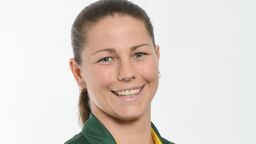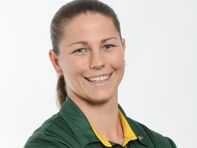On Tuesday, out English soccer star Anita Asante posted a heartfelt video on social media announcing she’ll be retiring at the end of the season after almost two decades at the top level of the game.
“In this game, we still have barriers to break to ensure that girls like me get to experience the best of this game,” Asante says. “I may be leaving the pitch, but my football journey will continue. Because I want to make sure that this game will one day be everyone’s game.”
On the eve of my 37th birthday, it's time to announce my retirement from football at the end of the season!
— Anita Asante (@NicenNeetz) April 26, 2022
I want to thank my family, team-mates, managers, fans & all the clubs I have played for.
To say it's been a privilege is an understatement. It's been a dream❤️ #ThisGame pic.twitter.com/8WDKIZXdan
The 71-times-capped stalwart of the English national team will be leaving behind a legacy on the pitch that only few can dream of: Four FA Cups, a Champions League title, and a UEFA Cup victory with Arsenal in 2007 – the only time a British team has ever won the European title in the history of the modern women’s game.
In 2009, Asante joined Sky Blue FC (currently Gotham FC in the NWSL) and helped the club win the inaugural WPS championship. After signing in Sweden, she also claimed multiple championship titles in the Damallsvenskan league, the Swedish Cup, and the Swedish Super Cup.
While playing in Malmö, Asante became passionate about social justice causes.
“It led me to be more of a vocal ally and an activist,” she said in an interview for the BBC. “I absolutely would say that my experiences in football and the people I’ve met along the way have empowered me to be more vocal with my opinions. I’m thankful for that. I needed to live that personal journey – finding myself being confident enough to come out with my sexuality. It’s given me strength every step of the way, even in the difficult points.”
In addition to supporting projects in support of women’s inclusion in football, Asante has vocally supported anti-racism initiatives, such as Show Racism the Red Card, and talked openly about her experiences as a Black woman in the sport.
Asante, who refers to herself as a private person, has also been intentional about living out with her girlfriend, reporter Beth Fisher, and playing her part in a generation of athletes in women’s soccer whose visibility as proudly LGBTQ+ broke with earlier attitudes of “don’t ask, don’t tell.”
“We are starting to see the shift again into this modern period where there’s more freedom to express yourself. Megan Rapinoe, Ashlyn Harris and other US players have been at the forefront of that and have shown that who they are as people and their relationships can be a positive way to interact with the sport,” she said in an interview feature for Lesbian Visibility Week in 2020.
Asante also puts in the work. She helped with the publication of a report advocating for gay soccer players around the world. And crucially, at a time in the U.K. when transphobic voices are being given greater and greater platforms, she is also a steadfast ally of the #BinTransphobia campaign by Football v Homophobia.
Back in 2016, Asante was also at the forefront of a conversation that has only recently started to be taken seriously in the U.S.: the issues of abuse and harassment from coaches in women’s soccer. . As recently as this week, it was reported the Houston Dash of the NWSL suspended their head coach and general manager due to an ongoing investigation to “review current and historic complaints of discrimination, harassment and abuse.”
Asante was shining light on this issue six years ago, when she supported Eni Aluko, another Team England player who called out former coach Mark Sampson for racism and harassment.
“To see how isolated she was in this shocked me,” Asante told the Telegraph. “[As a Black woman], if you have an issue or if you bring up something, then you’re just angry. It gets projected backwards. Then it becomes character assassination. I wasn’t having that.”
It’s players like Asante whose importance to the game comes not only from being a talented player and devoted teammate, but from the work and foresight she’s put in over so many years off the pitch to make the sport a more equitable space.
So, what’s next for No. 6?
Asante has been working on her PhD in the governance of women’s football. Hopefully we see her return to the sport in a leadership position.
“I feel like if I owned a club, I could ensure all the opportunities are there, for girls in particular, from all backgrounds,” she told the Telegraph. “That would be amazing.”







































